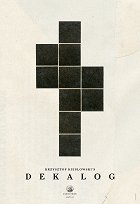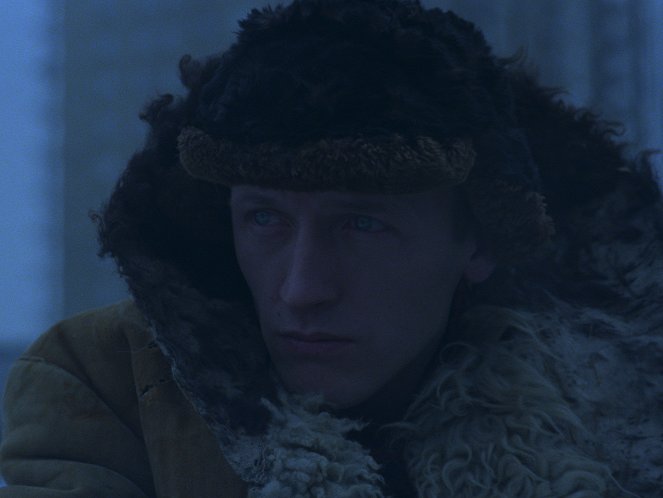Rendező:
Krzysztof KieslowskiZeneszerző:
Zbigniew PreisnerSzereplők:
Henryk Baranowski, Jerzy Stuhr, Daniel Olbrychski, Boguslaw Linda, Piotr Rzymyszkiewicz, Olaf Lubaszenko, Wojciech Klata, Wladyslaw Kowalski (több)Epizódok(10)
-
Az első parancsolat: "Én vagyok a te Urad, Istened. Uradat, Istenedet imádjad és csak neki szolgálj !" (E01)
-
Második parancsolat: "Isten nevét hiába ne vegyed" (E02)
-
Harmadik parancsolat: "Megemlékezzél arról, hogy az Úr napját megszenteljed" (E03)
-
Negyedik parancsolat:"Atyádat és anyádat tiszteljed!" (E04)
-
Ötödik parancsolat: "Ne ölj!" (E05)
-
Hatodik parancsolat:"Ne paráználkodj!" (E06)
-
Hetedik parancsolat:"Ne lopj" (E07)
-
Nyolcadik parancsolat:"Hamis tanúságot ne szólj felebarátod ellen!" (E08)
-
Kilencedik parancsolat: "Felebarátod feleségét ne kívánjad!" (E09)
-
Tizedik parancsolat:"Felebarátod házát, mezejét, másféle jószágát ne kívánjad!" (E10)
Tartalmak(1)
A Magyar Televízió 1991. augusztusától sugározta első alkalommal és nagy sikerrel az azóta sajnos elhunyt Krzysztof Kieslowski által rendezett tévésorozatot, amely a Tízparancsolat egyes pontjaihoz kötődve mindennapi történeteket mesél el kitűnő színészek közreműködésével. Az egyes epizódok közvetlenül nem függnek össze egymással, a Tízparancsolat azonban egy gondolati csokorba fogja őket. (DunaTV)
(több)Felhasználói recenzió kaylin ehhez a sorozathoz (10)
I don't really follow Polish works, but I'm starting to feel like it's a mistake. Because every filmography can have something great in it. And this generally ordinary story is presented incredibly emotionally, even though it doesn't try to squeeze emotions out of you, but simply creates them in you the way life itself would.
()
Második parancsolat: "Isten nevét hiába ne vegyed" (1990) (E02)
While watching this episode, you will realize that it is not the environment that necessarily has a negative impact, but the people who work in it, who pass through it. It's as if none of the characters here have any joy left in them, as if something inside each of them is dying more than living, which is in contrast with the fact that the main heroine is pregnant. Again, it is strong and unpleasantly depressive.
()
For me, so far the weakest film about how people cannot live without people, who they may not actually need that much. It is very challenging for us to find our place in the world and then keep it reasonably. Those heroes are somehow interesting, but they can also repel you a little with their behavior.
()
Ötödik parancsolat: "Ne ölj!" (1990) (E05)
If you have seen "A Short Film About Killing", this is its shorter version as part of the "Decalogue" series. The story is exactly the same, the shots are the same, it's just condensed into a shorter running time, which is less than an hour. Even so, it is a film that will touch you and show how senseless killing is, just like the strange punishment of the death penalty.
()
Hatodik parancsolat:"Ne paráználkodj!" (1990) (E06)
There's not much to be surprised about. It is basically an outcome from the movie "Rear Window," but portrayed completely differently and with completely different consequences in a different genre. Voyeurism is captured perfectly here, but even better, the overall climax is captured unexpectedly, yet it appears to be the only logical one. Once again, I applaud. It's no wonder Kieślowski extended it to an hour and a half in the film "A Short Film About Love."
()
Hetedik parancsolat:"Ne lopj" (1990) (E07)
Another very successful film within the whole "Ten Commandments". The story about a woman who perhaps had a child too early, but thought she was ready. An interesting situation, which is not taken to the extreme, but as if it were not far from it. Here, the ending is well done and it manages to shake you up a bit. Kieślowski created something great, even though it is shown through small stories.
()
After strong stories within the "Dekalog" series, one slightly weaker follows, which initially appears very powerful due to its theme, but in the end, it turns out that it won't be such a glory after all. And indeed, it isn't. I was expecting more from this film and the guilt is not presented in a way that truly moves me.
()
"Dekalog" definitely does not always contain stories that have hope at all costs, but in this case it is a story that is somehow nicely funny, even though it is actually cruel. This is a story where the happy end works because you don't feel like it's a real happy end, but something that was hard-won.
()
I can't help it, but even though the tenth episode of the "Dekalog" series is probably the most positive of all, at least in terms of how it is overall humorously directed, I still liked this episode the least out of all. In the end, I'm more into depressing films, even the ones where people die. This is quite a tragic realization about myself.
()

